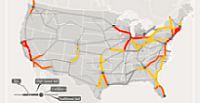In the shadow of the recession, a great migration of sorts has occurred in the suburbs. Though, since the rows of houses were first built outside America's city limits, this population turnover has been a long time coming.
A Brookings Institution preview of the 2010 Census released last year shows that the nuclear family out in suburbia with its kids and white-picket fences and two-car garages has been a misscharacterization for at least the last decade, if not longer. Racial and ethnic minorities now account for a majority of the population in 17 metropolitan areas, most in the South and Southwest, but regions like New York in the Northeast will soon follow. Also, since 2000, the number of 55to 64 year olds nationwide grew by nearly 50 percent. This past January, the first baby boomers turned 65.
Brookings demographer William H. Frey talks to Blueprint America about his findings, and what all of it means to a new kind of suburbia.











